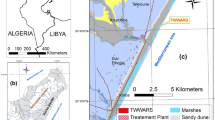Abstract
The current study investigates the impact of recharging of partially treated wastewater through an infiltration basin on the groundwater aquifer quality parameters. A monitoring program supported by a geographic information analysis (GIS) tool was used to conduct this study. Groundwater samples from the entire surrounding boreholes located downstream the infiltration basin, in addition to samples from the recharged wastewater coming from the Beit Lahia wastewater treatment (BLWWTP), were monitored and analysed between 2011 and 2014. The analysis was then compared with the available historical data since 2008. Results revealed a groundwater replenishment with the groundwater level increased by 1.0–2.0 m during the study period. It also showed a slight improvement in the groundwater quality parameters, mainly a decrease in TDS, Cl− and NO3 − levels by 5.5, 17.1 and 20%, respectively, resulting from the relatively better quality of the recharged wastewater. Nevertheless, the level of boron and ammonium in the groundwater wells showed a significant increase over time by 96 and 100%, respectively. Moreover, the infiltration rate was slowed down in time due to the relatively high level of total suspended solid (TSS) in the infiltrated wastewater.








Similar content being viewed by others
References
Abunada Z, Nassar A (2015) Impacts of wastewater irrigation on soil and alfalfa crop: case study from Gaza strip. Environ Prog Sustain Energy 24:648–654
Afifi S (2006) Evaluation of technical performance of Beit-Lahia wastewater treatment plant in the Northern Gaza Strip-Palestine. Alexandria Science Exchange 27:127
Al-Dadah EJY (2013) Using treated wastewater as a potential solution of water scarcity and mitigation measure of climate change in Gaza strip. J Water Resour Ocean Sci 2:79–83
Al-Juaidi AE, Kaluarachchi JJ, Mousa AI (2014) A hydrologic-economic model for sustainable water resources management in the Gaza Strip, Palestine. J Hydrol Eng 19. doi:10.1061/(ASCE)HE.1943-5584.0000960
Al-Sa’ed R (2010) A policy framework for trans-boundary wastewater issues along the Green Line, the Israeli–Palestinian border. Int J Environ Stud 67:937–954
Alagha JS, Said MAM, Mogheir Y (2014) Modeling of nitrate concentration in groundwater using artificial intelligence approach—a case study of Gaza coastal aquifer. Environ Monit Assess 186:35–45
Alslaibi TM, Abustan I, Mogheir YK, Afifi S (2013) Quantification of leachate discharged to groundwater using the water balance method and the hydrologic evaluation of landfill performance (HELP) model. Waste Manag Res 31:50–59
Alslaibi TM, Mogheir YK, Afifi S (2010) Analysis of landfill components in estimating the percolated leachate to groundwater using the HELP model. Water Sci Technol 62:1727–1734
Alslaibi TM, Mogheir YK, Afifi S (2011) Assessment of groundwater quality due to municipal solid waste landfills leachate. J Environ Sci Technol 4:419–436
APHA (2005) WEF (2005) Standard methods for the examination of water and wastewater, 21st edition. American Public Health Association, American Water Works Association, and Water Environment Federation, Washington, DC
ArcGIS Desktop (2010) Help ArcMap version 10.1; ESRI
Asano T, Cotruvo JA (2004) Groundwater recharge with reclaimed municipal wastewater: health and regulatory considerations. Water Res 38:1941–1951
Hamdan SM, Nassar A, Troeger U (2011) Impact on Gaza aquifer from recharge with partially treated wastewater. J Water Reuse Desalination 1:36–44
Icekson-Tal N, Blanc R (1998) Wastewater treatment and groundwater recharge for reuse in agriculture, Dan Region Recharge Project, Shafdan. In: International Conference TISAR 98., Rotterdam, p 103
Kenawy AA, Massoud U, Ragab E-SA, El-Kosery HM (2016) Investigation of the probable wastewater infiltration and its impact on groundwater quality by electrical resistivity tomography and hydrochemistry: a case study of the Pleistocene aquifer at El Sadat city, Egypt. Environ Earth Sci 75:1–12
Linse L, Dahlin AS, Nadeau E, Forkman J, Öborn I (2015) Boron fertilisation of organically managed grass-clover swards on coarse-textured soils: effects on botanical and element composition. Agric Food Sci 24:261–272
Misstear B, Banks D, Clark L (2006) Appendix 3 FAO irrigation water quality guidelines. Water Wells and Boreholes, pp 469–470. doi:10.1002/0470031344.app3
Qadir M, Sharma B, Bruggeman A, Choukr-Allah R, Karajeh F (2007) Non-conventional water resources and opportunities for water augmentation to achieve food security in water scarce countries. Agric Water Manag 87:2–22
Rahman M, Rusteberg B, Uddin M, Saada M, Rabi A, Sauter M (2014) Impact assessment and multicriteria decision analysis of alternative managed aquifer recharge strategies based on treated wastewater in Northern Gaza. Water 6(12):3807–3827
Shomar B, Fakher SA, Yahya A (2010) Assessment of groundwater quality in the Gaza Strip, Palestine using GIS mapping. J Water Resour Prot 2:93
Törnqvist R, Jarsjö J (2012) Water savings through improved irrigation techniques: basin-scale quantification in semi-arid environments. Water Resour Manag 26:949–962
UNSCO (2012) Gaza in 2020 A liveable place? Office of the United Nations Special coordinator for the middle East Peace Process (UNSCO): Jerusalem, August 2012:1–20. URL: http://www.unrwa.org/newsroom/press-releases/gaza-2020-liveable-place
Author information
Authors and Affiliations
Corresponding author
Additional information
Responsible editor: Philippe Garrigues
Rights and permissions
About this article
Cite this article
Alslaibi, T.M., Kishawi, Y. & Abunada, Z. Evaluating impacts of recharging partially treated wastewater on groundwater aquifer in semi-arid region by integration of monitoring program and GIS technique. Environ Sci Pollut Res 24, 13674–13686 (2017). https://doi.org/10.1007/s11356-017-8789-8
Received:
Accepted:
Published:
Issue Date:
DOI: https://doi.org/10.1007/s11356-017-8789-8




